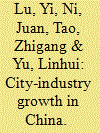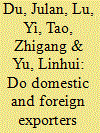|
|
|
Sort Order |
|
|
|
Items / Page
|
|
|
|
|
|
|
| Srl | Item |
| 1 |
ID:
124552


|
|
|
|
|
| Publication |
2013.
|
| Summary/Abstract |
This paper investigates the relevance of two leading theories of city-industry growth (i.e., specialization and diversity theories) in accounting for the fast yet uneven growth of industries in China's cities. Using a comprehensive dataset of manufacturing industries in 231 China's cities for the period 1998-2005, we find that specialization promotes city-industry growth, whereas diversity has no effect at all. In addition, we find that specialization is important for the growth of mature industries in China, but diversity is crucial for the development of China's relatively new and fast-growing industries. Our study contributes to the literature by examining the relevance of the specialization and diversity theories for a large and fast-growing developing economy.
|
|
|
|
|
|
|
|
|
|
|
|
|
|
|
|
| 2 |
ID:
112721


|
|
|
|
|
| Publication |
2012.
|
| Summary/Abstract |
In view of the importance of intra-firm trade and export-platform FDI conducted by multinationals, we investigate how domestic firms and foreign affiliates exhibited differential impacts of export entry and exit on productivity changes. Using a comprehensive dataset from China's manufacturing industries, we employ the Olley-Pakes method to estimate firm-level TFP and the matching techniques to isolate the impacts of export participation on firm productivity. Robust evidence is obtained that domestic firms displayed significant productivity gains (losses) upon export entry (exit), whereas foreign affiliates showed no evident TFP changes. Moreover, the productivity gains for domestic export starters were more pronounced in high- and medium-technology industries than in low-technology ones. We explain our findings from the perspective of the technology gap theory after considering processing trade and the fragmentation of production stages in the era of globalization.
|
|
|
|
|
|
|
|
|
|
|
|
|
|
|
|
| 3 |
ID:
192355


|
|
|
|
|
| Summary/Abstract |
Drawing on data from the China Household Finance Survey and China's Urban Business Environment Index, this study examines the effects of the business environment on entrepreneurial behavior in China. The identification uses the instrumental variables approach to address possible endogeneity. The empirical results show that improving the business environment can create more employment opportunities, optimize the structure of employment, and promote entrepreneurship; in terms of different dimensions of the business environment, improvements in public services, the market environment, and the legal environment play a stronger role in promoting entrepreneurship; from the entrepreneurial process perspective, improving the business environment can significantly enhance entrepreneurial willingness, boost the “metabolism” of entrepreneurial groups, and increase individual entrepreneurial identity. Further analyses on the mechanism indicate that improving the business environment is conducive to individual entrepreneurship through the following four channels: (1) creating more entrepreneurial opportunities, (2) reducing operating costs, (3) reducing financing costs, and (4) improving contract enforcement.
|
|
|
|
|
|
|
|
|
|
|
|
|
|
|
|
| 4 |
ID:
136225


|
|
|
|
|
| Summary/Abstract |
Property rights institutions significantly hinder firm productivity but not contracting institutions in China. Weakening property rights institutions by a standard deviation lowers firm productivity by 34.4% of its corresponding standard deviation. Small firms find weak property rights institutions more challenging than big firms do. We address endogeneity using instruments that are both relevant and separable. The results lend micro-level support to the explanation of country-level evidence given in Acemoglu and Johnson (2005), that individuals may get around weak contracting institutions by altering the contract terms but find it harder to mitigate the risk of expropriation.
|
|
|
|
|
|
|
|
|
|
|
|
|
|
|
|
|
|
|
|
|